
If you are a foodie who is constantly looking for the next spot, you would most likely be aware of the reputation of Katong and Joo Chiat as Singapore’s food paradise. Famous names like the legendary Katong Laksa, Chili Crab, and other multi-ethnic cuisines in the area immediately come to mind.
With many local cuisines that Singaporeans love and enjoy located in this cluster, it is not hard to see why District 15, which Katong and Joo Chiat belong to, is one of the top choices to buy property in. Furthermore, District 15 is known for its proximity to East Coast Park, its large variety of residential options, and its concentration of freehold land.
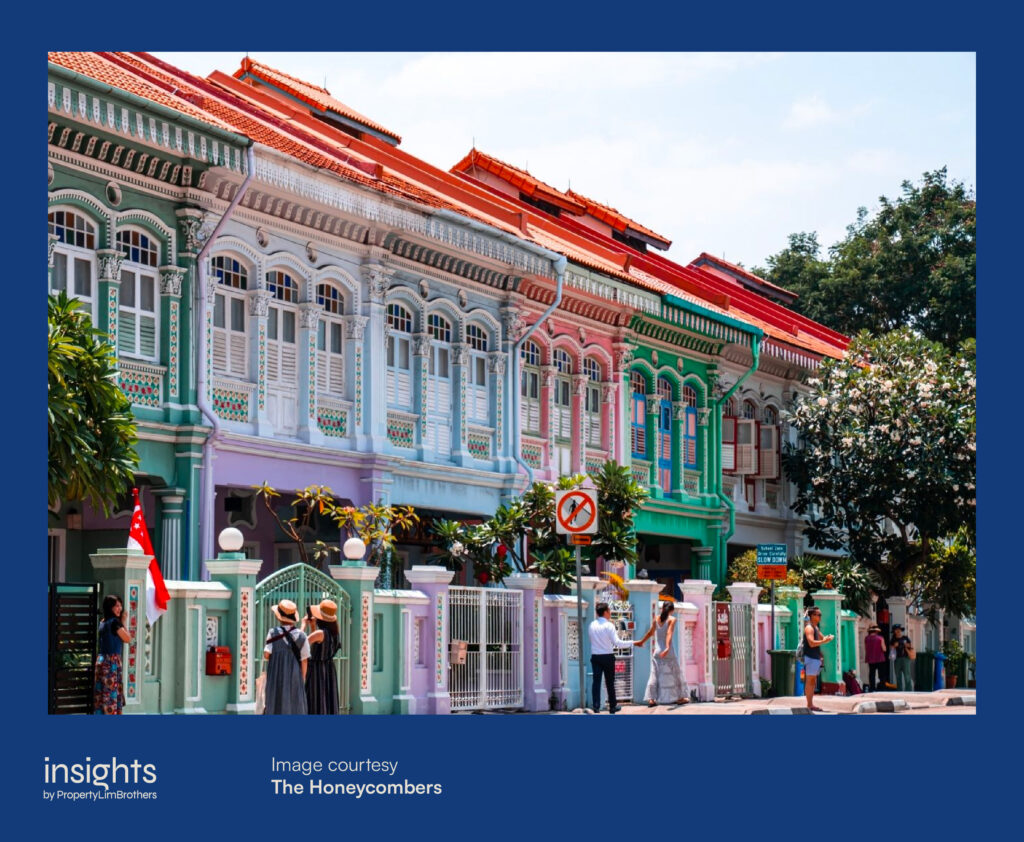
Katong and Joo Chiat are also home to a large enclave of unique shophouses steeped in Peranakan heritage. It is a distinct part of this area’s identity and an Instagram-worthy spot that draws both locals and tourists. In this article, we will explore how the area’s status as a food paradise and cultural hotspot impacts the rentability and performance of D15 Shophouses. Do they fare better than shophouses in other regions?
History of Katong and Joo Chiat
The history of Katong and Joo Chiat dates back to the early 19th century when the area was covered with attap-roofed kampung (villages) and coconut plantations that stretched from the Geylang River to Siglap Road.
From Geylang Serai to the sea, Joo Chiat Road was a dirt road that ran through the plantations in the 1920s. It was given that name in honour of Chew Joo Chiat, a wealthy landowner and philanthropist who acquired vast tracts of property in Katong and was dubbed the “King of Katong”.
Between the 1920s and 1930s, many families relocated east to Katong and Joo Chiat. As a result, bungalows, shophouses, and places of worship were erected, reflecting the diverse and multicultural region we know today.
Where can you find D15 Shophouses?
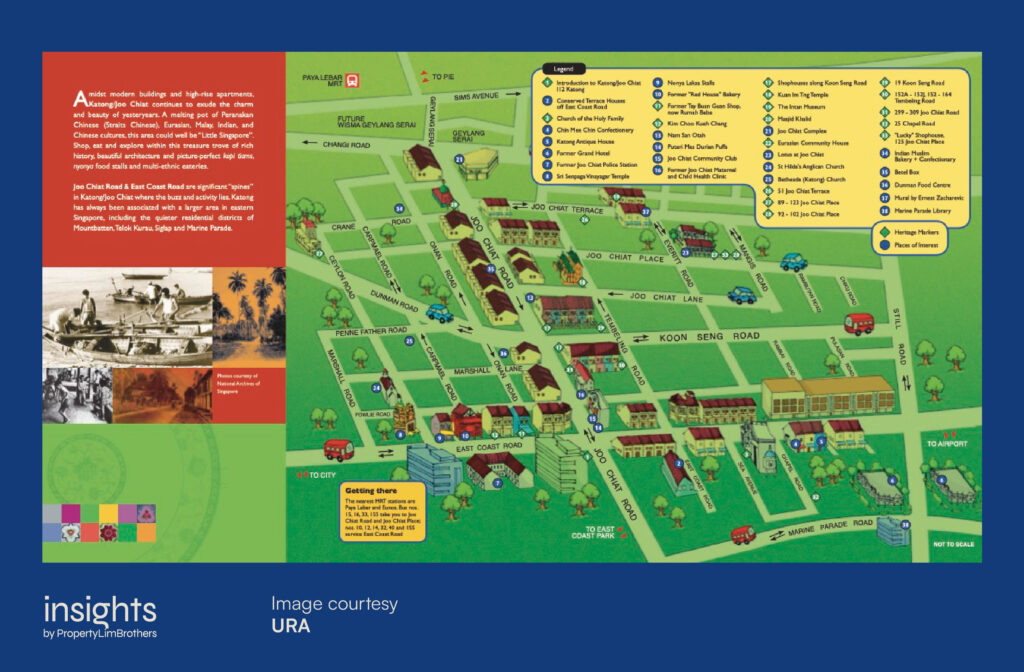
Although District 15 spans a large area that includes Tanjong Rhu, Amber Road, Meyer, Katong, Joo Chiat, East Coast, and Marine Parade, the shophouses here are mainly found in the Katong and Joo Chiat areas.
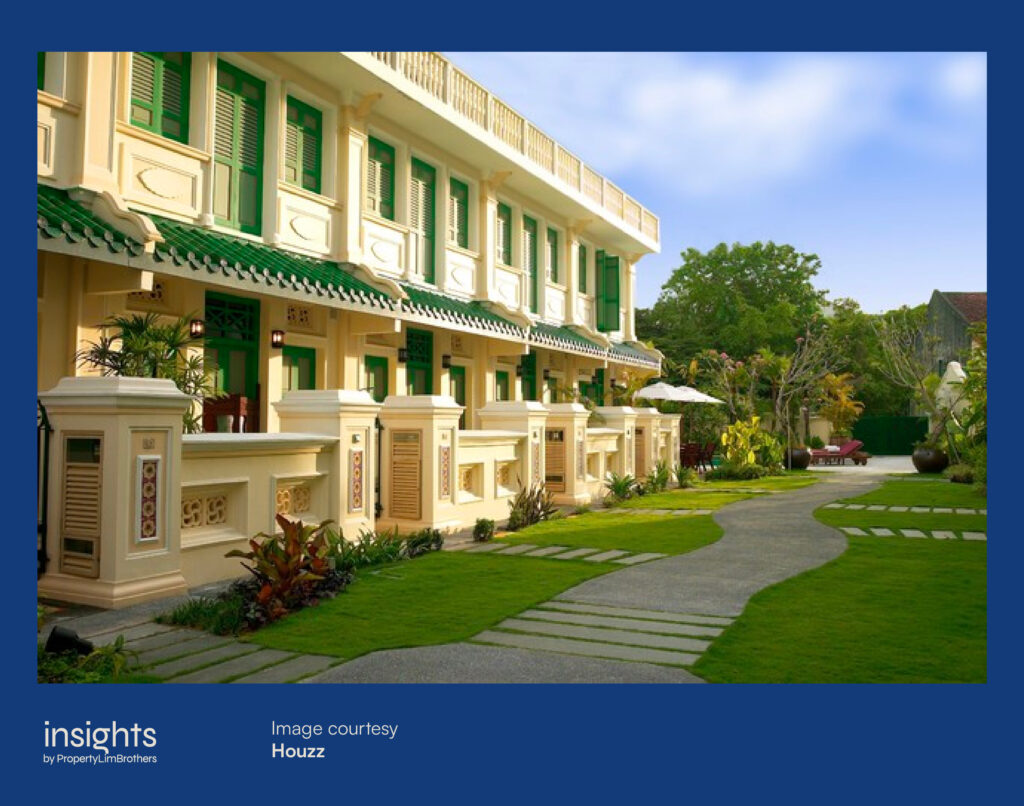
Katong and Joo Chiat are famous for their vibrant shophouse façades along Koon Seng Road that feature pastel hues, ceramic Peranakan floral motifs, and geometrical tiles. To the north, you can also find a stretch of conserved shophouses with iconic green windows along Lotus @ Joo Chiat.
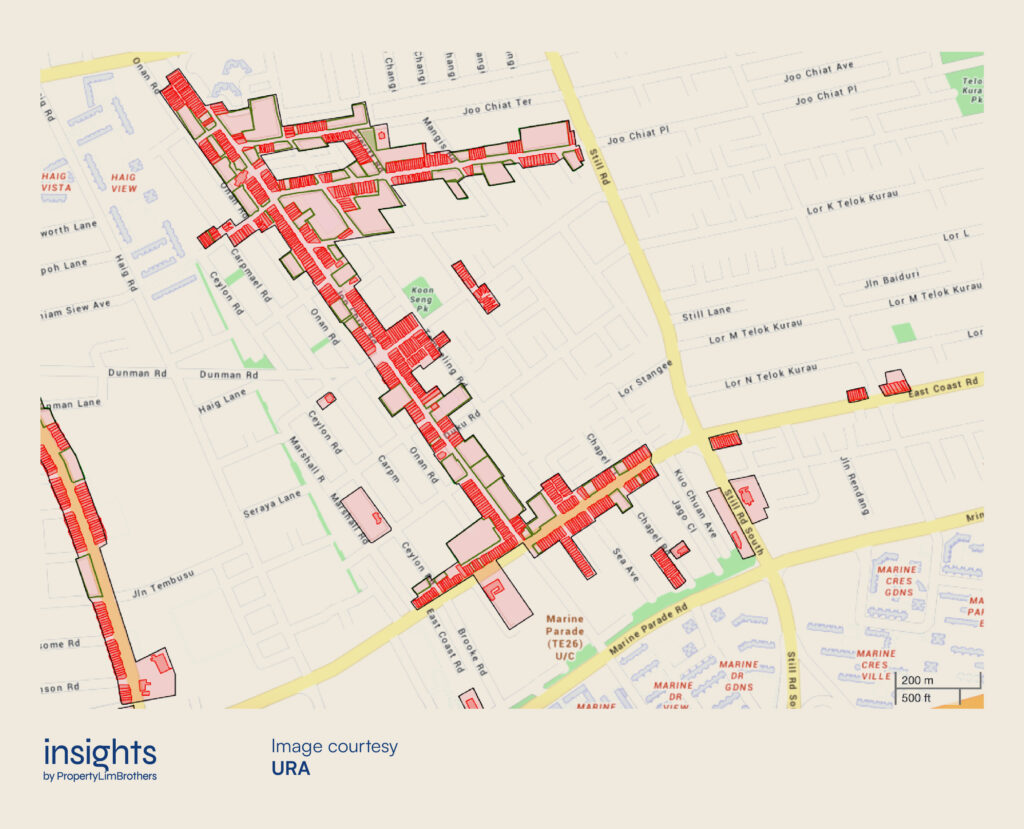
You will find that most of the shophouses in the area have been gazetted for conservation by the URA. In fact, more than 800 structures in the area have been conserved to protect its unique architectural heritage. In acknowledgement of the efforts made by locals to preserve their cultural history, the National Heritage Board named Joo Chiat as Singapore’s first Heritage Town in February 2011.
How do D15 Shophouses perform?
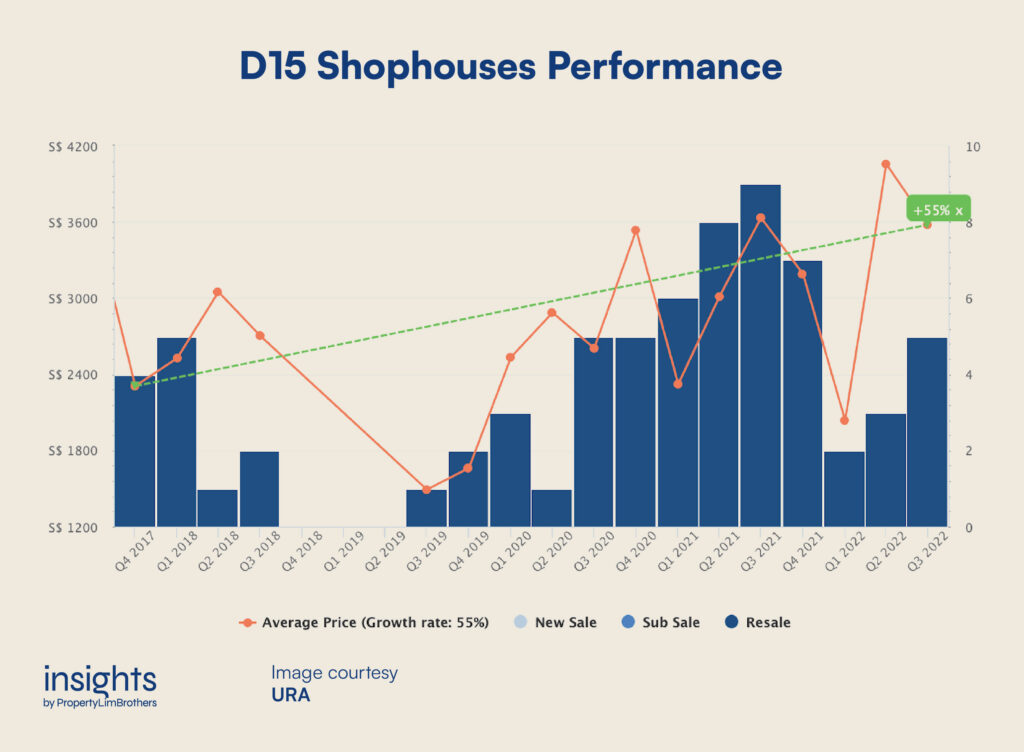
Over the past five years, prices of Shophouses in D15 have grown by 55%, an average annual growth of 11%. Most of the growth was driven by higher prices from three transactions in Q2 2022, which sold at an average of $4,056 PSF
There are 65 transactions over the five years, with the bulk (66%) coming from the pandemic and post-pandemic era. However, only ten units in District 15 were sold this year from Q1 to Q3 2022, a decline from the region’s previous two years of steady growth. The volume of transactions may be slowing down due to existing shophouse owners hanging onto their units in anticipation of increased investor interest, which would likely result in a profit, given the cultural value of the neighbourhood and the possibility for further gentrification.
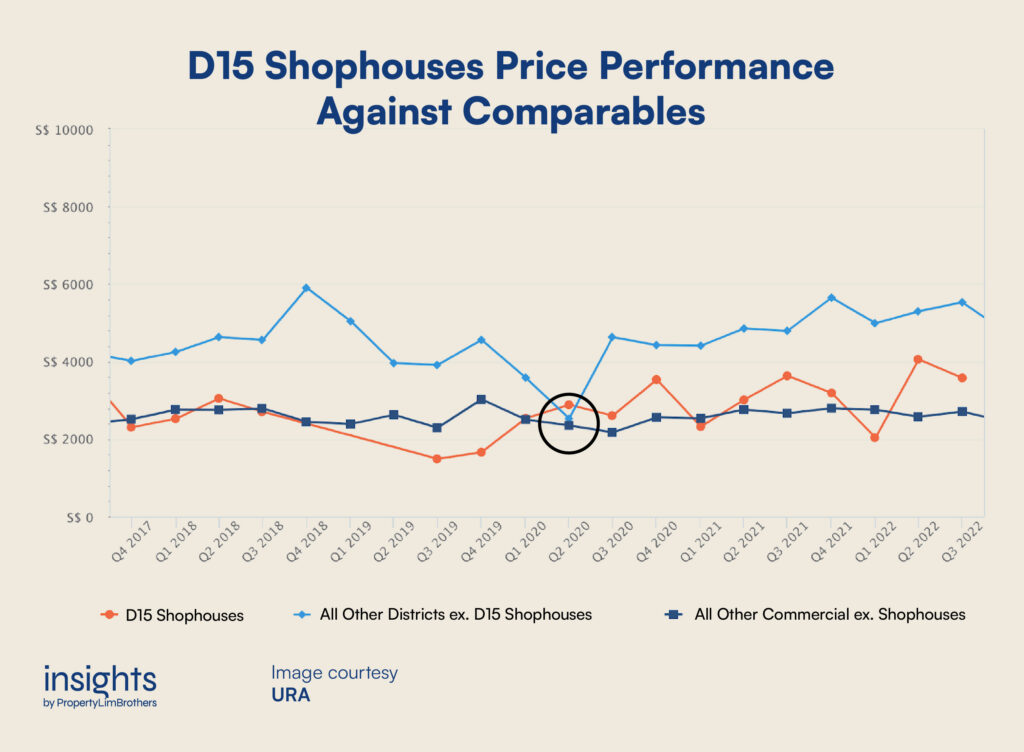
Comparing D15 Shophouses to all other shophouses in Singapore, the growth of D15 shophouses slightly edges out by a margin of 17%. This could be because D15 Shophouses have a generally lower average PSF, with the highest average PSF of $4,056 recorded in Q2 2022. Even though D15 Shophouses outperformed the general shophouses segment in Q2 2020, the sector eventually bounced back strongly in Q3 2020 and has been growing steadily since. Its recent performance in Q2 2022 has also reduced the disparity gap between D15 Shophouses and the rest.
On the other hand, the rest of the commercial properties (excluding shophouses) have not seen much growth. Even though the average quantum is lower or around the same as D15 Shophouses, the growth rate of other commercial properties has been just 8% over the past five years. This means that D15 Shophouses have outperformed other commercial properties by a substantial margin of 47%, proving that finding and sticking to strong performers is more important than just going for the lowest quantum.
After all, the demand for this asset type is not expected to decline anytime soon, given the limited supply of conserved shophouses in Singapore.
Examining the success of D15 Shophouses
To understand why D15 Shophouses are performing better than other commercial properties, we first have to examine the unique selling point of the region and shophouses as a niche asset class.
As we mentioned earlier, the Katong and Joo Chiat area has a reputation for being a food paradise and a cultural hotspot. This reputation inevitably draws locals and tourists alike, thus increasing the footfall of the area in general. Shophouses in the area are in a favourable position to benefit from this. Business owners can leverage the area’s reputation by aligning their business to the appeal – in this case, F&B operators stand to gain the most. Drawn by the architectural motifs (attraction) and tasty cuisine (purpose), it is a win-win situation for businesses as foot traffic can be easily converted into sales. Hotel and co-living operators have also been acquiring shophouses to leverage the recovering hospitality sector and the active residential rental market here.
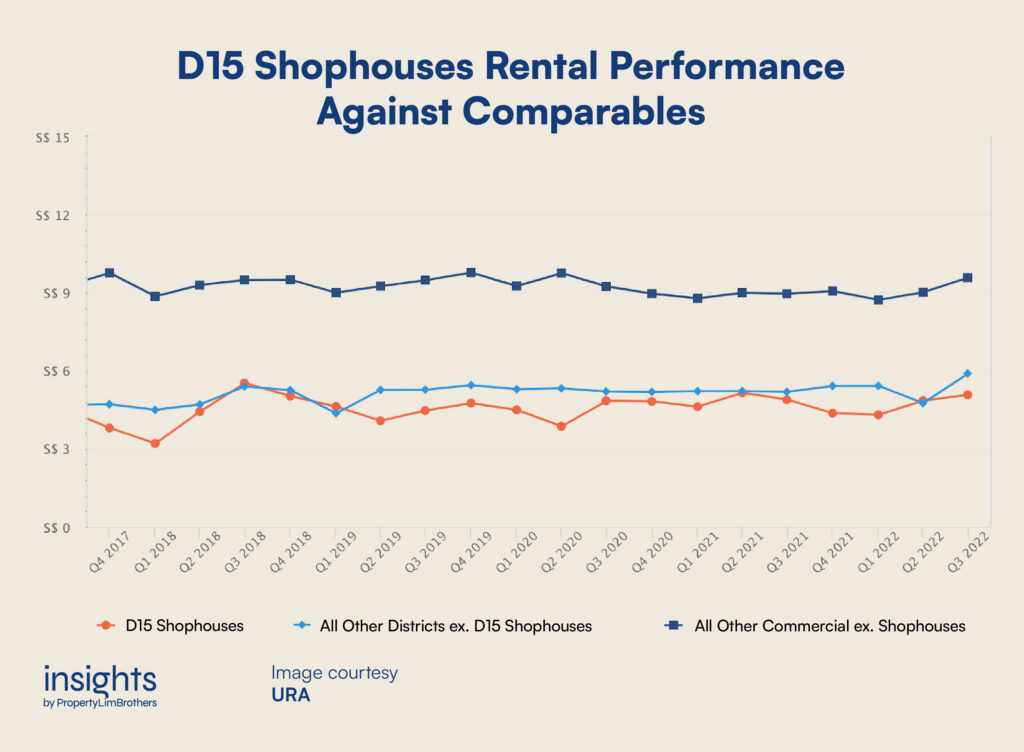
Given this potential, it is not surprising for such shophouses to be in strong demand. According to a recent article by The Business Times, shophouse rentals have extended gains in Q3 2022 as landlords price up. As rental demand and rentability increase, more shophouse owners are choosing to increase rents instead of selling their assets. This could mean a drop in the volume of transactions moving forward.
Although rental prices are typically volatile, coupled with the fact that there are much fewer rental contracts compared to the larger segments of all other shophouses and commercial properties, the rental performance for D15 Shophouses saw an impressive 33% growth from Q4 2017 to Q3 2022. This strong rental performance further solidifies the allure and potential of D15 Shophouses.
Closing Thoughts
The food culture and options, coupled with the strong architectural heritage of the Katong and Joo Chiat regions, are a potent combination of appeal for D15 Shophouses. The signature aesthetic of conservation shophouses in the D15 Koon Seng Road area also makes the area a tourist hotspot. Despite being part of the RCR area, its proximity to iconic landmarks like East Coast Park makes it desirable.
Future developments such as the Thomson-East Coast Line (TEL) and Paya Lebar business hub are also compelling reasons to look into properties in District 15, be it for own stay or investment.
Although the disparity gap between D15 Shophouses and the rest has been reduced in Q2 2022, whether it will outperform shophouses in other regions remains to be seen as the volume of transactions will likely dip due to landlords holding and increasing rents rather than selling. With the rental market in Singapore on a hot streak, shophouse rentals are likely to continue climbing, signalling a good time to hunt for disparity and find opportunities for a good entry point.
Despite all these positive indicators, potential commercial property investors must pay close attention to rising interest rates which can jeopardise affordability, cash flow, and profitability. With that said, the lower PSF in District 15 may provide a good entry point for some shophouses here compared to other commercial properties around Singapore. Additionally, the freehold D15 Shophouses could be the ideal strategy to weather the downturns in the real estate market without experiencing lease decay.
If you are interested in learning more about Shophouses and how they can fit into your property portfolio, feel free to contact our experts. We would be delighted to walk you through your property journey. Until then, see you in the next one.








